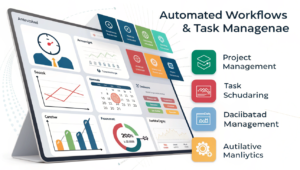How AI Transforms Small Business Operations
Did you know that 57% of small businesses using AI report increased efficiency? Moreover, research shows that AI in small business operations can boost profits by up to 20%. Today, companies across the US, Europe, Canada, Mexico, South America, Africa, Australia, and Asia are leveraging AI in small business to streamline tasks, enhance customer service, and drive growth. In this blog, we present seven game-changing tips that reveal how AI transforms small business operations. By learning these strategies, you can make informed decisions that lead to smarter and more efficient operations.
1. Enhance Customer Service with AI Chatbots
 First and foremost, AI chatbots have revolutionized customer service. By implementing chatbots, businesses can handle customer queries 24/7. Consequently, this reduces wait times and improves customer satisfaction. Moreover, chatbots can learn from each interaction, thus providing increasingly personalized support over time. Additionally, they free up staff to focus on complex tasks, thereby increasing productivity. Many small businesses are now integrating chatbot technology on their websites and social media platforms, which leads to faster response rates and improved customer engagement.
First and foremost, AI chatbots have revolutionized customer service. By implementing chatbots, businesses can handle customer queries 24/7. Consequently, this reduces wait times and improves customer satisfaction. Moreover, chatbots can learn from each interaction, thus providing increasingly personalized support over time. Additionally, they free up staff to focus on complex tasks, thereby increasing productivity. Many small businesses are now integrating chatbot technology on their websites and social media platforms, which leads to faster response rates and improved customer engagement.
2. Streamline Operations Through Automation
 Secondly, automation is key to optimizing small business operations. Small businesses can automate repetitive tasks such as invoicing, inventory management, and data entry. Consequently, this reduces human error and frees up valuable time for more strategic initiatives. Furthermore, automation tools powered by AI integrate seamlessly with existing software, creating a more efficient workflow. As a result, companies save costs and experience smoother daily operations. In addition, the time saved can be reinvested into innovation and customer relationship building.
Secondly, automation is key to optimizing small business operations. Small businesses can automate repetitive tasks such as invoicing, inventory management, and data entry. Consequently, this reduces human error and frees up valuable time for more strategic initiatives. Furthermore, automation tools powered by AI integrate seamlessly with existing software, creating a more efficient workflow. As a result, companies save costs and experience smoother daily operations. In addition, the time saved can be reinvested into innovation and customer relationship building.
3. Utilize AI for Data Analytics and Informed Decision-Making
 Next, AI-driven data analytics empower small businesses to make smarter decisions. With the help of AI, companies can analyze customer behavior, market trends, and operational data with remarkable precision. Therefore, businesses can identify opportunities, anticipate challenges, and optimize their strategies. Additionally, predictive analytics enable small companies to forecast sales trends and adjust inventory accordingly. As a result, data-driven decision-making leads to improved efficiency and competitive advantage. Moreover, these insights help in setting realistic goals and measuring progress effectively.
Next, AI-driven data analytics empower small businesses to make smarter decisions. With the help of AI, companies can analyze customer behavior, market trends, and operational data with remarkable precision. Therefore, businesses can identify opportunities, anticipate challenges, and optimize their strategies. Additionally, predictive analytics enable small companies to forecast sales trends and adjust inventory accordingly. As a result, data-driven decision-making leads to improved efficiency and competitive advantage. Moreover, these insights help in setting realistic goals and measuring progress effectively.
4. Automate Routine Tasks to Boost Productivity
![]() Furthermore, AI simplifies routine tasks that often consume valuable time. For example, AI algorithms can automate email sorting, scheduling, and follow-ups. As a result, employees can concentrate on more creative and strategic aspects of their work. Moreover, task automation reduces the likelihood of errors and improves overall efficiency. Additionally, by offloading mundane tasks to AI, businesses create a more dynamic and agile work environment. Consequently, the productivity boost also translates to better service delivery and higher customer satisfaction.
Furthermore, AI simplifies routine tasks that often consume valuable time. For example, AI algorithms can automate email sorting, scheduling, and follow-ups. As a result, employees can concentrate on more creative and strategic aspects of their work. Moreover, task automation reduces the likelihood of errors and improves overall efficiency. Additionally, by offloading mundane tasks to AI, businesses create a more dynamic and agile work environment. Consequently, the productivity boost also translates to better service delivery and higher customer satisfaction.
5. Personalize Marketing Strategies with AI
 Additionally, personalization in marketing is made effortless with AI. By analyzing consumer data, AI can tailor marketing messages to individual preferences. Therefore, personalized campaigns yield higher engagement rates and drive customer loyalty. Moreover, AI tools help in segmenting audiences, optimizing ad spend, and measuring campaign performance. As a result, small businesses can achieve more targeted marketing efforts that resonate with customers. Furthermore, personalized marketing leads to better conversion rates and a stronger return on investment.
Additionally, personalization in marketing is made effortless with AI. By analyzing consumer data, AI can tailor marketing messages to individual preferences. Therefore, personalized campaigns yield higher engagement rates and drive customer loyalty. Moreover, AI tools help in segmenting audiences, optimizing ad spend, and measuring campaign performance. As a result, small businesses can achieve more targeted marketing efforts that resonate with customers. Furthermore, personalized marketing leads to better conversion rates and a stronger return on investment.
6. Reduce Costs and Improve Efficiency
 In addition, AI significantly reduces operational costs. By automating processes and optimizing resource allocation, small businesses can cut expenses and boost efficiency. For instance, AI tools can identify cost-saving opportunities across supply chain management and energy consumption. Consequently, these savings can be reinvested into growth initiatives or innovation. Furthermore, AI-driven solutions often provide insights into process improvements, which lead to long-term operational efficiency. As a result, businesses not only become more competitive but also more resilient in fluctuating markets.
In addition, AI significantly reduces operational costs. By automating processes and optimizing resource allocation, small businesses can cut expenses and boost efficiency. For instance, AI tools can identify cost-saving opportunities across supply chain management and energy consumption. Consequently, these savings can be reinvested into growth initiatives or innovation. Furthermore, AI-driven solutions often provide insights into process improvements, which lead to long-term operational efficiency. As a result, businesses not only become more competitive but also more resilient in fluctuating markets.
7. Leverage AI Tools for Business Growth
 Finally, leveraging comprehensive AI tools can drive significant business growth. Small businesses are increasingly adopting platforms that integrate AI for customer relationship management, project management, and business intelligence. As a result, these tools provide actionable insights and real-time monitoring of business performance. Moreover, by integrating AI across various functions, companies can scale operations quickly and respond to market changes proactively. Additionally, these tools often come with user-friendly interfaces, making them accessible even for businesses with limited technical expertise. Consequently, AI becomes a cornerstone for sustainable growth and innovation.
Finally, leveraging comprehensive AI tools can drive significant business growth. Small businesses are increasingly adopting platforms that integrate AI for customer relationship management, project management, and business intelligence. As a result, these tools provide actionable insights and real-time monitoring of business performance. Moreover, by integrating AI across various functions, companies can scale operations quickly and respond to market changes proactively. Additionally, these tools often come with user-friendly interfaces, making them accessible even for businesses with limited technical expertise. Consequently, AI becomes a cornerstone for sustainable growth and innovation.
Conclusion: The Future is Here with AI in Small Business
 In conclusion, integrating AI in small business operations is no longer a luxury but a necessity for competitive survival. By enhancing customer service, streamlining operations, driving data analytics, automating routine tasks, personalizing marketing, reducing costs, and leveraging growth tools, small businesses can achieve remarkable efficiency and scalability. Moreover, the future holds even more potential as AI technologies evolve and become more accessible across global markets. Embracing these strategies will not only improve operational performance but also boost overall profitability and market relevance.
In conclusion, integrating AI in small business operations is no longer a luxury but a necessity for competitive survival. By enhancing customer service, streamlining operations, driving data analytics, automating routine tasks, personalizing marketing, reducing costs, and leveraging growth tools, small businesses can achieve remarkable efficiency and scalability. Moreover, the future holds even more potential as AI technologies evolve and become more accessible across global markets. Embracing these strategies will not only improve operational performance but also boost overall profitability and market relevance.
For additional insights, visit HubSpot’s AI in Business Guide.








